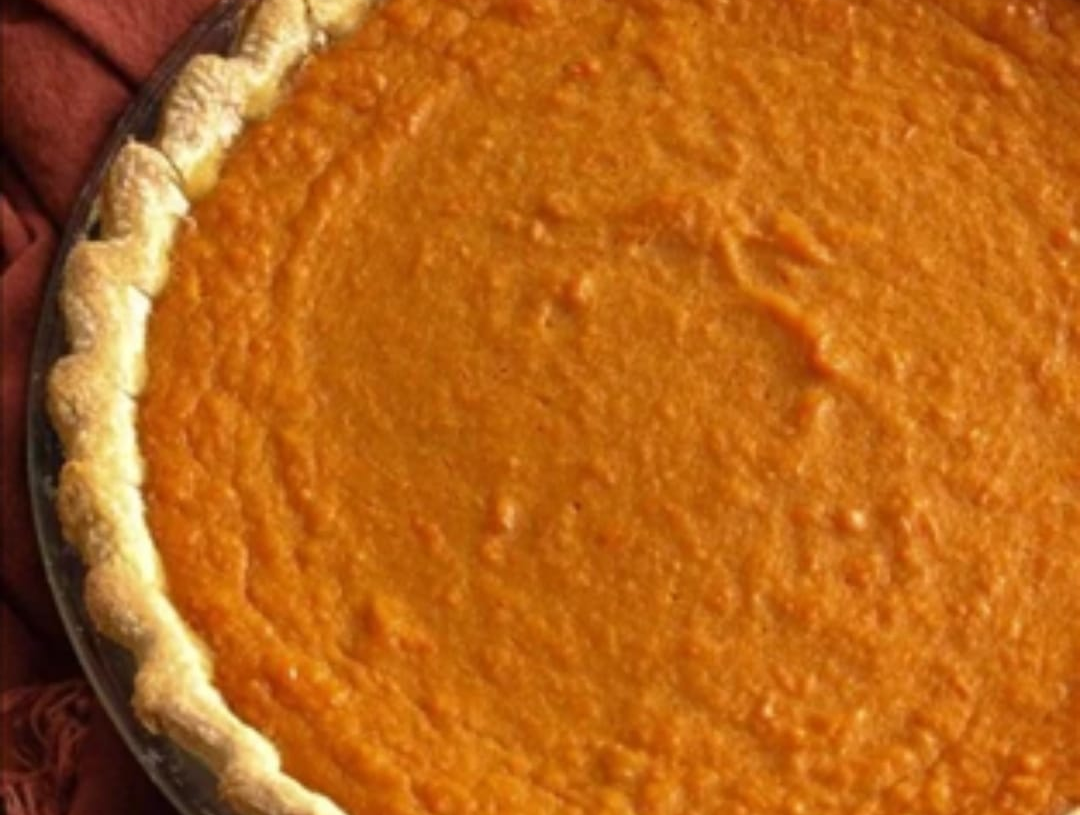Ingredients:
For the crust:
- 1 ½ cups all-purpose flour
- ½ teaspoon salt
- ½ cup coconut oil (solid, not melted)
- 4-6 tablespoons ice water
For the filling:
- 2 cups mashed sweet potatoes (about 2 medium sweet potatoes, cooked and peeled)
- ½ cup maple syrup or agave nectar
- ½ cup coconut cream
- ¼ cup almond milk (or any other non-dairy milk)
- 2 tablespoons cornstarch or arrowroot powder
- 1 teaspoon vanilla extract
- 1 teaspoon ground cinnamon
- ½ teaspoon ground nutmeg
- ¼ teaspoon ground ginger
- ¼ teaspoon salt
Instructions:
For the crust:
- In a mixing bowl, combine the flour and salt. Add the coconut oil and mix until the mixture resembles coarse crumbs.
- Gradually add ice water, one tablespoon at a time, and mix until the dough comes together. Form the dough into a ball, flatten it into a disc, wrap it in plastic wrap, and refrigerate for 30 minutes.
- Preheat your oven to 375°F (190°C).
- Roll out the chilled dough on a floured surface to fit a 9-inch pie dish. Carefully transfer the rolled-out dough to the pie dish, trim any excess, and crimp the edges. Use a fork to poke some holes in the bottom of the crust.
- Blind bake the crust by lining it with parchment paper and filling it with pie weights or dried beans. Bake for about 15 minutes. Remove the weights and parchment paper and bake for an additional 5 minutes until lightly golden. Set aside to cool.
For the filling:
- In a blender or food processor, combine the mashed sweet potatoes, maple syrup or agave nectar, coconut cream, almond milk, cornstarch or arrowroot powder, vanilla extract, cinnamon, nutmeg, ginger, and salt. Blend until smooth and well combined.
- Pour the sweet potato mixture into the pre-baked pie crust, smoothing the top evenly.
- Bake the pie in the preheated oven for 45-50 minutes or until the filling is set and slightly jiggles in the center.
- Once done, remove the pie from the oven and let it cool completely before slicing.
- Optionally, serve with a dollop of coconut whipped cream on top.
Gut Health:
Plant-based diets are often associated with improved gut health due to the high fiber content from fruits, vegetables, and whole grains. A healthy gut microbiome is linked to better digestion and overall well-being.
Anti-Inflammatory Properties:
Many plant-based foods have anti-inflammatory properties, which can help in reducing inflammation in the body. Chronic inflammation is associated with various health issues, and a vegan diet may contribute to its prevention.
Sports Performance:
Contrary to the misconception that vegan diets lack protein, many successful athletes follow plant-based diets to enhance their performance. Plant-based proteins can support muscle building and recovery.
Reduced Risk of Foodborne Illnesses:
Plant-based diets eliminate the risk of foodborne illnesses associated with the consumption of undercooked or contaminated animal products.
Economic Impact:
A vegan diet can be more economical as plant-based protein sources tend to be cost-effective compared to some animal products. It may be a budget-friendly option for individuals or families.
Mindful Eating:
Adopting a vegan lifestyle often promotes mindful eating. Being more conscious of food choices and sources can lead to a healthier relationship with food and a greater appreciation for the environmental impact of dietary decisions.
Preservation of Biodiversity:
The expansion of animal agriculture often leads to habitat destruction and loss of biodiversity. Choosing a vegan diet supports the preservation of ecosystems and the protection of various species.
Culinary Diversity:
Veganism introduces individuals to a diverse range of cuisines and ingredients from around the world. Exploring plant-based cooking can be a culinary adventure, embracing flavors and techniques from different cultures.
Reduced Antibiotic Resistance:
The use of antibiotics in animal farming contributes to the rise of antibiotic-resistant bacteria. Opting for a vegan diet can be a way to reduce the demand for such practices and promote responsible antibiotic use.
Cruelty-Free Beauty and Personal Care:
Veganism extends to beauty and personal care products. Choosing cruelty-free, vegan alternatives ensures that your lifestyle aligns with ethical choices beyond just dietary preferences.
